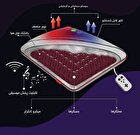Iranian Researchers Produce Food for Aquatic Animals by Treatment of Wastewater

Arash Javanshir, a faculty member of the Agriculture and Natural Resources Department University of Tehran, used a method based on performance of the particle capture system and treated wastewater and recycled water from the effluent resulted from alcohol production, and could treat the polluted wastewater of alcohol-producing plants to make food for aquatic animals.
“Treatment of this wastewater and the protein in the obtained sludge is not only suitable for the food diet of aquatic animals, but it will also lead to purification of water and returning it for reuse in plants and reduction of water consumption,” he said
Warning that the wastewater is harmful to plants and animals due to the existence of the hydrogen sulfide gas,” Javanshir said, adding if all plants use this system, they will help both in decreasing water and electricity consumption and keeping the environment clean.
In a relevant development last year, Iranian researchers at Amirkabir University of Technology’s chemical engineering faculty had also succeeded in finding a solution for purification of water and removal of amoxicillin antibiotic at treatment plants.
“Due to the development of medicine and health equipment, we have witnessed their penetration into the soil ecosystems as well as the surface and underground water g/L,” said Somayyeh Sohrabi Shahsavari, a Ph.D. graduate at Amirkabir University of Technology and the researcher of ‘synthesis of nanostructured Ti/TiO2/ZnO/GOx biophotocatalyst in a microfluidic system, its characterization and evaluation in order to degrade amoxicillin micropollutants’ project.
“Therefore, concerns have increased about the disposal of wastewater containing them into the environment. In this project, we chose amoxicillin as it is the most prescribed antibiotic in Tehran and it is prioritized over other antibiotics in terms of potential risks,” she added.
“We used nano and micro technologies in this project. This project aims to break down an emerging micropollutant while introducing a new biophotocatalyst and several reactors in bulk and microfluidic scales for its production,” Sohrabi Shahsavari said.
4155/v
























